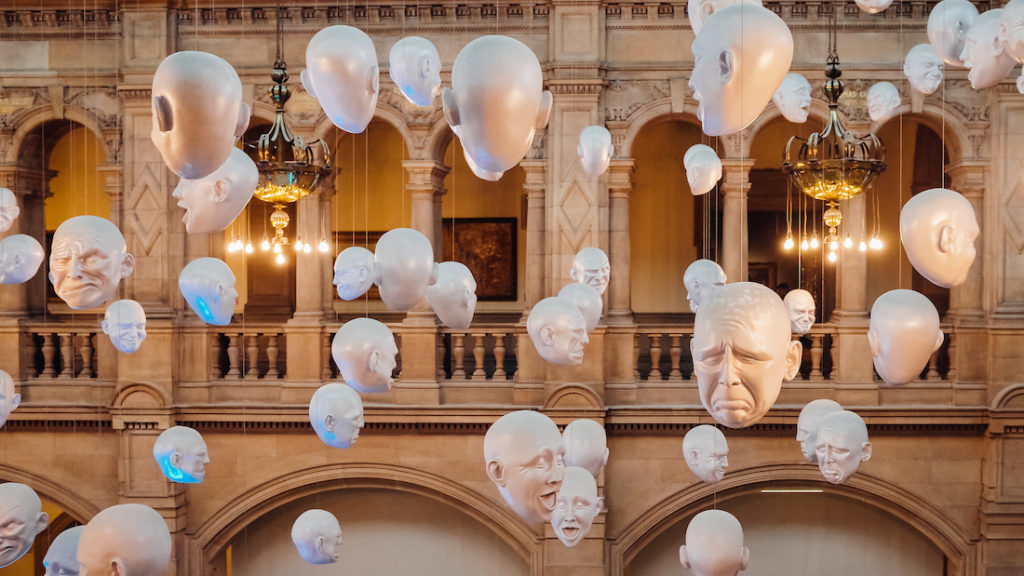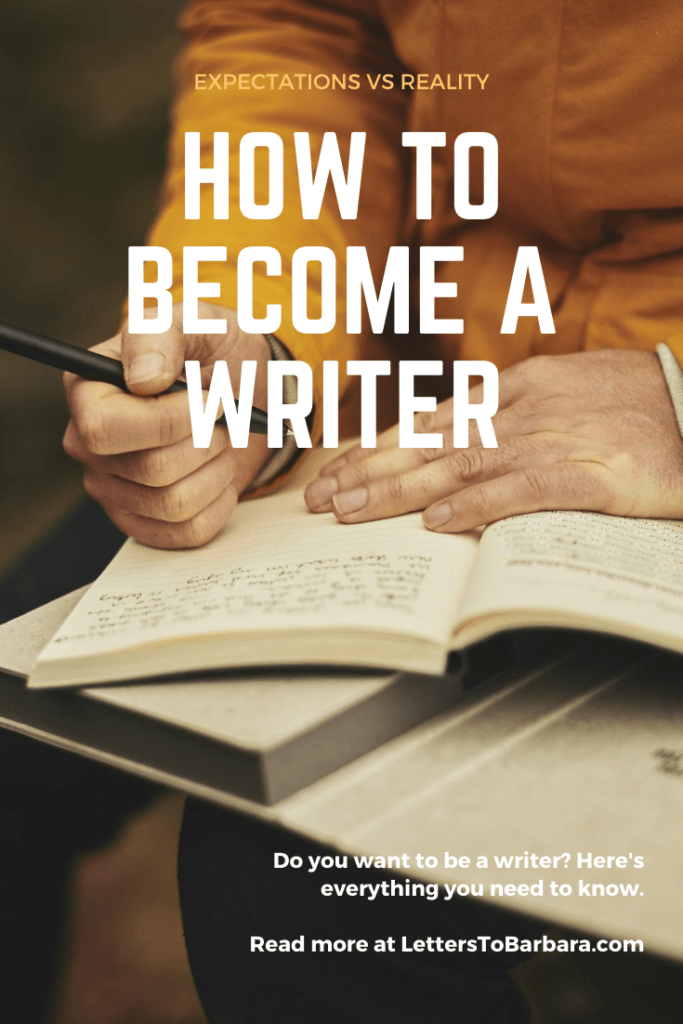I published my first novel back in 2007, and -I won’t lie- I felt immortal. Getting published doesn’t happen overnight, though. I started writing sometime between 2000 and 2001, and there was always a question in my mind: how can I really become a writer? I kept facing this question for several years. To be honest, I thought that the reply would be short and obvious. However, and as I figured out throughout the years, there was not a simple answer. It was more of a cluster of answers -and none of them was short.
Throughout the years, the question transformed: in the beginning, it was a matter of craft, but later on, it turned into an existential one. As time went by, the more I tried to reply, the more I failed. It took me years to understand that this wasn’t a simple question. I thought that reply would be “Just write more” or something similar -but this wasn’t the case. Day after day and year after year, I realized that in order to reply properly, I’d have to build a writer’s mindset. Hence, how to become a writer transformed into how to be a human being that writes.
Now, I’m writing this post in 2020, and I have just turned forty. To this day, I have written four books, I’m running this blog, I have written for several magazines (both in Greece and abroad), and I spoke to literary festivals. Still, I’m often wondering how one can become a writer, and also how to become a better writer. After almost two decades of writing, I wish that I could offer you a piece of quick and easy advice, but the truth is that I can’t.
So, in this post, I’m going to put down everything I learned down the road. I firmly believe that the things you’ll read here are important not only for becoming a writer but actually for being one. Before I start, I’d like to say this: a writer is always a writer. It doesn’t matter if you want to be a novelist, a travel writer, or a blogger. If you are willing to write and you want to do it properly, the path is always the same.
How to become a writer: expectations vs. reality
The road to becoming a writer is a long one. Sometimes, we hope for things that either won’t happen or will take years to achieve. I’m approaching the subject in an Expectations vs. Reality structure not because I want to discourage you. I just want to highlight the contrast and show the way you have to cover before you reach your goals.
*Some of the links are affiliate links. It means that if you purchase something through the links, I might earn a small commission at no additional cost to you.
1) Read everything

Expectations: “I’m not that much into reading; I just want to write.”
It might sound odd to start a post about writing with a “read everything” statement. It shouldn’t. I never met a writer that wasn’t also an avid reader. Whatever surrounds us can turn into writing material. That said, a writer should really read everything. From top-class literature to newspapers, from philosophy to pop magazines. It’s not that you’ll have to chase ideas from everything you read. What I find more important here is that this will help you build your worldview.
A writer is not just someone who writes down nice words. Add too many nice words, and the text might not flow. Let alone that you might cringe the reader. What a writer must do is offer unique perspectives and explanations about the things happening around us. I don’t want it to sound too heroic (because it’s not), but a writer should be there to observe, analyze, criticize, and offer enjoyable texts. If you don’t read, then the chances are that your writing will be self-referential and -most likely- boring.
By reading a lot, it doesn’t only mean that you keep yourself updated. It also means that you can see how other writers structure their texts, how they build their characters, how they describe places. Sure, there will be periods that you will be under the influence of great writers, and you’ll struggle to get over them. But, when you analyze the texts, you’ll figure out that you’ve learned how to improve your writing.
For example, before starting to do travel writing, I kept reading for years books of travel literature. I read everything I could find (you can see my favorite travel books here), and slowly I started writing for the places I visited. The same goes for fiction: there were times in my life that I’d read 250-300 books per year, and I’d try to keep notes and analyze them. I often think that without reading, I wouldn’t be able to write a proper text.
Reality: I prefer to make a statement here. If you don’t read, you won’t be able to write about the things you want to express.
2) Write every single day

Expectations: “I am only going to write when I have inspiration.”
I firmly believe that from all the false statements about writing, that’s the wrongest one. Whenever you come across a marvelous piece of writing, don’t ever think that it was written quickly, in one strike, after the muses visited the writer’s mind. This is 99,99% of the time, not the case. Writers don’t write only when they feel inspired. There is a daily struggle with the words, and there are days that, after eight hours on your desk, you won’t have a sentence, and there are also times that after months or years of writing, authors reject their manuscripts. Writers are ready for daily battles with the white paper, not for Rendez-vous with the muses.
One of the hardest things is to sit down and write when you feel empty. And yet, if you are taking writing seriously, that’s what you actually have to do. A writer by profession must sit down and write. Procrastinating or waiting for inspiration will probably mean that you don’t approach writing as a job. In fact, if you don’t write for months or years in a row, it means that you probably see it as a hobby. But if you want to get serious and you really want to become a writer, you should write every day.
Reality: Inspiration lasts for a few moments, and what it probably offers is sudden clarity. Whatever follows is months/years of hard work. If you want to become a writer, you should write every day.
3) Keep notes

Expectations: “I want to write a novel.”
Every aspiring author who wants to get serious about writing (I was no exception) is daydreaming of writing a novel. That’s a noble ambition, and, of course, it’s something to admire. However, writing a novel takes a long, long time, and if you don’t have experience in writing, you won’t only struggle, but you’ll most likely fail. While it’s absolutely okay to fail, what I want to say here is that you should better start from shorter texts.
Keeping notes of the things you do or the places you visit will help you experiment with writing. Sooner or later, you will understand how to approach things in your writing. That said, you will figure out the voice of each text. A visit to the supermarket will most likely have a different tone from attending an art exhibition opening. Moreover, building characters or describing things will unlock your creativity, and it’ll help you expand your narratives.
Still to this day, wherever I go, I have a pen and a notebook with me. Moreover, since I want to capture moments in different ways, I have a small camera in my bag. Add on top my laptop and a small video camera, and you have a setup for capturing impressions. I wrote a long post about my blogging gear, which is always my writing gear (you can see it here). Try to record everything that surrounds you, and make sure to put yourself into these notes. Slowly, you will figure out how to structure your texts -and after a while, you’ll be indeed on your way to writing a novel.
Why’s that? Because a novel is a complex piece of writing. It requests different angles, several voices, characters, descriptions. If you haven’t tried all these things before, how can you really do them?
Reality: Keep well-structured notes and develop your skills in a shorter form. Don’t try to start writing a novel if you haven’t written anything before.
4) You cannot become a writer if you don’t listen to the people

Expectations: “I want to write about the things I have in my mind.”
This one actually has a dual meaning. On the one hand, listening to people means that you will understand their agonies and their thoughts. This is first-hand material for a writer, and transcribing how people feel it’s also a way to figure out what’s going on in society. On the other hand, listening to the people will teach you something essential about writing: how to craft dialogue.
Self-referential texts usually have one common problem: all the characters have the same voice -and that’s the voice of the writer. Dialogue is often regarded as a way to say quickly the statements we want to make. That’s the wrong approach. The moment you give voice to a character, it means that he/she has a) something important to say and b) something that no one else could say. A dialogue forcing the plot can cringe the reader. Each person in your text should have a distinct voice. If everybody has the same voice, then why do you need characters?
So, by listening carefully to what people have to say, you gain a double advantage. First, you can understand what’s bothering people, and second, it will also help you write plausible dialogues.
Reality: If you don’t just want to write a diary, you should pay attention to what the people say. You won’t only improve your dialogues, but you’ll also make your writing enjoyable to others. If they can’t identify with what you write, they’ll probably skip it.
5) Getting paid to write

Expectations: “I’m going to get quickly rich from writing and live a good life.”
There are certain myths about writers. I wrote earlier about people believing that writing is only a matter of inspiration. An equally false approach is that writers get famous fast, they make tons of money, and they end up in Hollywood-like parties with sex, drugs, and rock’n’roll. Or, when it comes to people willing to become travel writers, they often imagine paid vacations, sipping cocktails, and writing a couple of words in front of the Caribbean sunset. Honestly, save yourself the trouble: that’s not the case.
The hard truth is that for many, many years, you won’t probably make any money from your writing. Moreover, you won’t have a constant flow of money. If you think that after a couple of years into writing, you’ll have a cheque of a few thousand dollars waiting for you every month, then you will be very disappointed. Most of the writers won’t even be able to buy a pair of shoes within the first year(s) of writing. If you want to become a writer, you should accept beforehand that you’ll struggle a lot and that you won’t make any money for a while. For how long, nobody can really tell.
It took me quite a while to earn my first money from writing. And yet, don’t expect something mind-blowing. At first, it was enough money for two visits to the supermarket, and then it was a bit more. As a writer, no one can guarantee how often you’ll get paid. Sometimes you’ll have decent periods of income, and others, you’ll struggle. The hard truth is that most of the writers (even the very talented ones) give up because they can’t earn a decent living.
All that said, you become a writer, and you are a professional writer because you can’t imagine living in any other way. You become a writer because you’ll get crazy if you don’t write. If you think that being a writer is the highway to glamour and money, I can assure you that it’s not.
Reality: Being a professional or creative writer (or any other kind of writer) doesn’t translate to an easy-going life full of parties and glamour. You will most likely struggle your whole life. Be a writer because you can’t be (or don’t want to be) anything else.
6) Constantly motivate yourself to write

Expectations: “I’ll take a long break from writing if I’m not in the mood.”
In a direct connection to the “Write every day” section, one of the hardest tasks of a writer’s life is keeping himself/herself constantly motivated to write. There will be days (or even weeks) that you’ll find yourself demotivated. You will ask yourself if it still matters to become a writer or if it’s better to skip it. You won’t be in the mood for writing, you’ll often lose your faith in that author’s life you imagined, and you’ll feel like struggling for nothing. I’ve been several times in such phases, and it sucks.
However, if you want to stick to it because you can’t imagine doing anything else in your life, you should insist. You should find ways to motivate yourself, and you’ll have to make this journey worth the struggle. Sometimes it’s good to start something from scratch, something that will motivate you to write. Starting a blog can be a good idea (see how to start one here), while other times, you’ll think of switching to a different form (travel writing, freelance writing, etc.)
In this case, you are, unfortunately, alone. You can discuss it with the people you love, but even if they are enthusiastic, remember that you are the one you’ll have to struggle with. However, starting something new in your writing career can be refreshing. It will help you to motivate yourself and rediscover your lost faith. For people willing to insist, I can only encourage them to find new ways of writing.
Reality: Taking long breaks from writing is not a good idea. You should keep your hand warm, and you should experiment. Some days off are okay, weeks or months are not recommended.
7) How to become a writer: edit, edit, edit

Expectations: “I wrote it in one strike, and I believe it’s great.”
Writing an article, a blog post, or a book is always challenging. You have to dedicate yourself in order to achieve it. It usually translates to several hours of work, and it’s always satisfying to write down the final word and add the last full stop. I know that one gets tired of writing, and when he/she finishes, all he/she wants is to enjoy the end of a task. It’s also common, though, that people believe that they did their best and, subsequently, there’s no need for editing.
In my opinion, editing is equally important as writing. Sometimes there are lines, paragraphs, or even pages that don’t work. I know it’s a hard task to edit or even remove them. Every time I finish a book, I read it again and again, several times. I can only consider myself to be lucky because the publishing houses always have professional proofreaders. I work together with them in polishing the text and making it ready for turning into a book.
But even before the proofreader starts editing my book, I do a lot of work on my own. It usually takes months until I finish editing a manuscript. I follow the same procedure in short articles or even in my blog posts. I cut down phrases, I remove paragraphs, sometimes I remove pages. And then, I rewrite whatever doesn’t work, and there are times that I start from scratch. While it is understandable that not everything you write is destined to be a masterpiece, editing is a cornerstone element of writing. That said, if you have the slightest worry that something is either not fitting or isn’t good enough, then remove it or rewrite it.
Reality: Your first draft will never be ready for the printing house. Every piece of writing requires editing. Even a masterpiece needs editing in order to shine.
8) Accept rejection as part of building a writing career

Expectations: “My writing shines, and I can’t see how someone can reject it.”
Now, that’s a tough one, and it will affect you sentimentally. You put in lots of effort, and you worked hard. While it’s good to trust your skills, it’s equally important to understand that you will have to deal with rejection. I don’t mean here a rejection or two. I actually mean plenty. Sometimes your writing won’t be good enough, while other times, it won’t be what the editor or publisher is looking for. There can also be bad timing, in which another writer produced something assumed better than yours. From all these situations, there’s one common outcome: your work gets rejected.
And that’s okay. Rejections are part of a writer’s life. I can’t even remember how many times my manuscripts got rejected. Sometimes they received praise, but “it’s not what we are currently looking for,” while other times, the publishers didn’t like them. The rejection is most likely a very formal (i.e., faceless) letter or e-mail, thanking you for your submission, but, nah, we don’t want it. It sounds tough -and especially the first few times, it feels very tough.
And yet, somehow, you have to deal with it, digest it, accept it, and move forward. You can’t write to please everyone, and not everybody will see your potential as an author, poet, or essayist. But as I said, it’s okay. You can breathe, and you can be happy that you finished something. If you still believe in what you wrote, submit it again and again. Actually, send it everywhere. And if it doesn’t work, move forward. It’s not the end of the world. Rejections should motivate you to produce even better content, not to skip everything. In fact, the takeaway point here is: carry on.
Reality: You will face rejection countless times. Be ready for it. Use it as fuel for your motivation, and don’t feel that everybody hates you. It’s part of the game. Yes, it’s hard, but it is what it is.
How to become a writer: equipment you need

In comparison to other artists, writers don’t need that many things to start working. In fact, you can be okay with just a pen and paper (if you are more old-fashioned) or just a laptop. What is vital for a writer is to observe everything and record everything. I’m writing down a very short list of things I usually have with me in my bag. I’m also adding here my laptop because I have it always with me when I’m doing travel writing. Of course, a laptop is useful anyway, but as you can imagine, I don’t have it with me when I’m going for a walk in my neighborhood. However, the rest of the things are always in my bag.
A pen. Even though we live in a digital era, I always have a pen with me. I always enjoy writing in hand, and it helps me to keep notes quickly. Sure, I could use Google Docs on my smartphone; however, I do find a pen more convenient when I’m outside.
A notebook. I always have a Moleskine (or two…) with me when I’m leaving home. I usually buy packets of three, so I don’t have to order all the time. A pen and a Moleskine sound ideal because I can even have them in my pocket.
A laptop. I used to write in a typewriter when I first got into literature. These days are gone, though, and I sometimes feel nostalgic about them. However, a laptop is a must, and it saves me a lot of trouble, especially when I have to deliver everything by e-mail. I use a MacBook Pro, and I’m extremely satisfied. Plus, it’s super lightweight when I’m traveling.
A camera. I wrote an extensive review of my small Ricoh GR ii, my most faithful companion when it comes to “keeping visual notes.” Sometimes I take a photo instead of writing about it. Moreover, I’m using the small Ricoh for running this blog as well. Check the current price of the Ricoh here.
A video camera. That’s the latest addition to my bag, and it’s a video camera lighter than my smartphone. I bought the DJI Osmo Pocket for capturing short clips (that sometimes turn into travel videos), and I’m delighted with it. Check the DJI OP price here.
And that’s it with my writing equipment. As you can see, I really appreciate lightweight things.
How to become a writer: an epilogue

Now, I know that I sounded a bit tough on some points. And I did it on purpose. But let me explain why. First of all, I never want to discourage anyone from getting into writing. On the contrary, I always try to encourage people to express themselves. But here’s the thing: I believe that people should get into writing for the right reasons. Vanity, a Hollywood-life, tons of money, and parties are not reasons for starting to write. These things won’t probably happen anyway. Second, and even more important than the first point, is that there are loads of people claiming that writing is easy, and you’ll see success in no time. That’s a lie. Writing is a struggle, and it’s up to you to decide if you’re really willing to cope with it.
Therefore, in this post, I preferred to offer some writing tips and points on becoming a writer instead of focusing on vanity and lifestyle matters. If you think that you’ll succeed easily and get rich by being lazy, then writing isn’t probably for you. Professional writing is tough, and it takes time -and you won’t probably earn enough money anytime soon. But if deep in your heart you feel that the only thing you want to do in this life is to write, then go for it and don’t listen to anyone. The struggle might be real, yes, but the journey is rewarding.
See more of my writing and blogging articles here.
Interested in travel writing? Check my ebook here.
Pin it for later

Please share, tweet, and pin if you enjoyed reading How to become a writer: Expectations vs. Reality. Your support keeps this website running and all the info up-to-date. 🙂
Last Updated on February 27, 2021 by George Pavlopoulos





Hi George, writing is so hard and laborious. I never thought it would be this hard. I love reading all kinds of stuff but it hasn’t seemed to help my writing ability when I think about it. Writing doesn’t seem to be passed on by genes either as my first cousin has a PHD in English. If so I somehow missed out on that skillset. I’m finding that it doesn’t seem to be getting any easier over time either so I’m lost in some sort of no man’s land. One thing this post has done is that it has inspired me to fix that post you made recommendations on a while ago regarding my Mount Olympus Hike (link provided). I think it reads much better now but it took a lot of work. I thought it would take me a couple of hours at most to fix but it took at least over 12 hours. I’m much happier with it now but wow it blows my mind on how time can fly when you’re writing. Hours go like minutes and then you wonder what you have really achieved at the end of it all. I’m in awe of anyone that writes consistently while doing it well. Oh yeah, I also included the George Dalaras story in the post. It seems to fit in ok. Keep up the good work George. All the best, John
Hey there, John.
I’m glad that the article about writing motivated you to edit your Mount Olympus story. I just went through it, and it’s really better than the one I read in the past. It flows nicely -and the extra story with Dalaras adds a lot, in my opinion. Regarding the genes and literature, I don’t know what to tell you: on the one hand there’s always something like talent, but on the other, there’s hard work. I tend to believe more in hard work, but I also realize that motivation and skillset often go hand in hand. If it offers any comfort, writing isn’t becoming easier for me either as time goes by. I struggle with it most of the time. In order to produce content (blog posts, books, short stories, articles, both in Greek and English), requests planning in advance, lots of thinking in my free time, and approximately 8 hours of work per day. And yet, it’s not always productive.
Last but not least, editing takes so much time. But that’s part of the beauty, I guess. I accepted a long time ago that I would struggle, and this somehow liberated me.
Keep up the good work, John.
Take care,
George
Thanks George. I’m blown away how you can write in English and Greek and do it so well. Do you prefer writing in English or Greek? Looking forward to your next post about your vacation. Hope you enjoy!
Hey John,
I think writing in Greek is significantly easier for me. On the other hand, writing in English uncovered different ways to cope with the language. Nowadays, I try to implement things (structure, form, etc.) from one language to the other and see how they work. It’s an interesting experiment for sure. But as I said, it is much easier to write in Greek.
I think I’ll give myself one week off and probably won’t post this Saturday; going on vacation after such a long time needs to be celebrated somehow. But of course, I’m going to post some articles from the islands 🙂
Take care,
George
Hey Geroge
Just discovered your blog while looking for camera settings. Im also reading a book which resonates with some of your advice here. Have you read Vivian Gornick’s The Situation and the Story?
Hello dear Mia,
That’s a nice coincidence. I know Vivian Gornick, but I haven’t read “The Situation and the story” so far. I’ve only read “Fierce Attachments”. I just checked the book you mentioned, and it seems very interesting; I’ll add it to my summer reading list. If you are into writing, I found great advice in the books of Roland Barthes when I was just starting with novels and shorts (for example, “The pleasure of the text“). It’s less of a writing guide, but it analyzes the theoretical background of writing. I also found interesting ideas in “Not knowing” by Donald Barthelme, although the book deals with various issues that often have nothing to do with writing.
Let me know if you’re searching for something more specific about writing -I’ll be happy to (try to) help 🙂
Best regards,
George